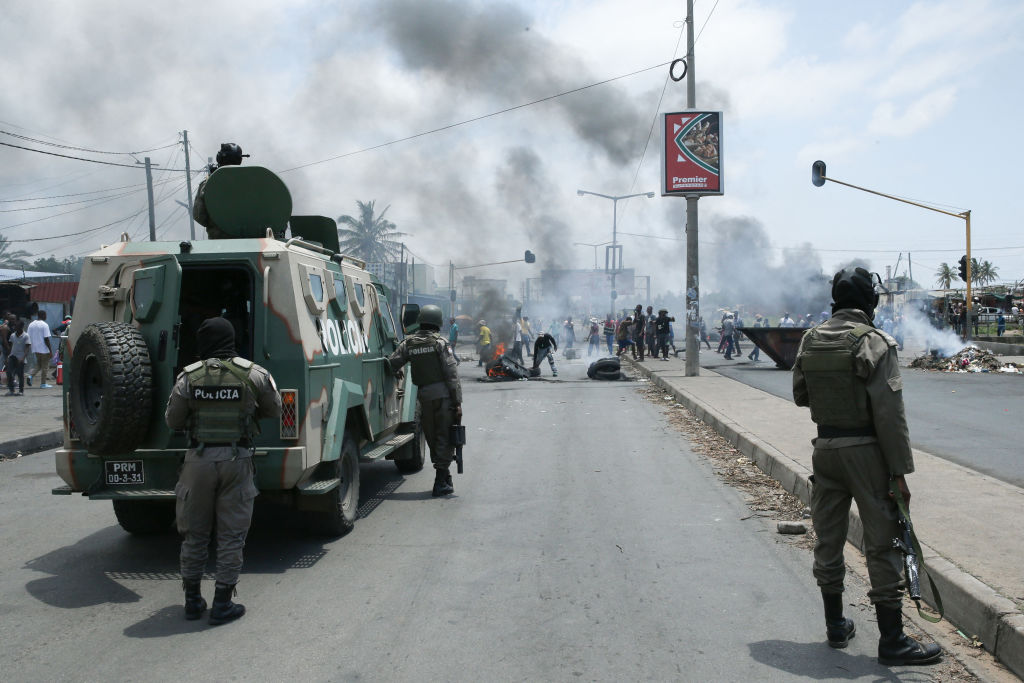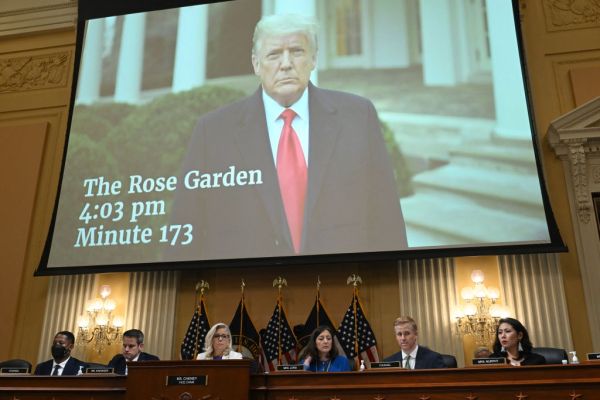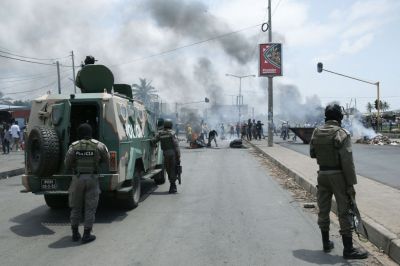Happy Tuesday! The Metro Richmond Zoo in Moseley, Virginia, recently welcomed Poppy, a baby pygmy hippo whose name was chosen in an online poll that garnered more than 116,000 votes from across the world. It’s an impressive PR feat for the month-old hippo, but she has a long way to go before she can compete with the viral sensation that is Moo Deng.
Quick Hits: Today’s Top Stories
- Canadian Prime Minister Justin Trudeau announced his resignation in a press conference Monday after weeks of intensifying opposition from members of his own Liberal Party. “Canadians deserve a real choice in the next election,” he told reporters. “It has become obvious to me, with the internal battles, that I cannot be the one to carry the Liberal standard into the next election.” Trudeau’s path to remaining in power narrowed when his finance minister stepped down in December, citing disagreements over spending in the face of a possible “tariff war” with the U.S., and New Democratic Party leader Jagmeet Singh—a key ally keeping Trudeau’s party in power—committed to bringing a motion of no confidence against the Liberal government when Parliament returned. Trudeau, who has served as prime minister since 2015, will remain in office until a new party leader is selected.
- Congress certified President-elect Donald Trump as the winner of the U.S. presidential election on Monday, with Vice President Kamala Harris presiding over the joint session of the House and Senate. “Today, America’s democracy stood,” Harris said after the ceremony. Former Vice President Mike Pence—whom Trump pressured to overturn the election on January 6, 2021—hailed the “peaceful transfer of power” and the “return of order and civility to these historic proceedings.”
- U.S. Steel and Nippon Steel filed a lawsuit against the Biden administration on Monday, claiming the president—who on Friday blocked a $14.9 billion merger between the two companies—had “ignored the rule of law to gain favor” with trade unions. They alleged that the Biden administration attempted, for “purely political reasons,” to prevent the Japanese firm’s acquisition of U.S. Steel through an unfair national security review process. Additionally, the companies filed a suit accusing the United Steelworkers union and Cleveland-Cliffs, a steel company that unsuccessfully tried to acquire U.S. Steel, of conspiring against any rival takeovers of U.S. Steel.
- North Korea on Monday test-fired a medium-range ballistic missile that flew nearly 700 miles before falling into the Sea of Japan, according to South Korean defense officials. The launch coincided with U.S. Secretary of State Antony Blinken’s visit to Seoul for meetings with top South Korean leaders, including acting President Choi Sang-mok. It marked Pyongyang’s first ballistic missile test since November 5 and drew swift condemnation from South Korea, Japan, and the U.S., with Blinken describing the launch as “yet another violation of multiple U.N. Security Council resolutions.”
- President Joe Biden on Monday announced an executive action to ban new offshore oil and gas drilling across 625 million acres of the Atlantic and Pacific oceans, the Eastern Gulf of Mexico, and the Northern Bering Sea. The restrictions will likely have little immediate effect—drilling is currently limited or outlawed in several of the areas covered by the order. Trump pledged to reverse the decision, but the law that it invoked—the Outer Continental Shelf Lands Act, under which a presidential action is considered permanent—may make the move difficult for future administrations to undo.
- A federal judge held former New York Mayor Rudy Giuliani in contempt of court on Monday for failing to respond to requests for information about his assets in a $148 million defamation lawsuit. The former Trump attorney was ordered in October to turn over personal assets to two Georgia election workers who won a defamation suit against him after he falsely claimed they committed election fraud in the 2020 elections. It’s unclear what penalties Giuliani, who is due back in federal court on January 16, will face as a result of the contempt finding.
- Michael Barr, the head of the top bank watchdog at the Federal Reserve, on Monday announced plans to step down from his position. Barr had been a proponent of more stringent regulations on banks throughout his tenure as vice chair for supervision, raising the specter of clashes with the incoming Trump administration. “The risk of a dispute over the position could be a distraction from our mission,” Barr said in announcing his decision, which will take effect on February 28.
Mozambique in Crisis

In the southern African nation of Mozambique, a 16-year-old protest anthem has given voice to a new generation of dissenters. The fiercely anti-government verses of “Povo no Poder”—or “People in Power”—can now be heard at demonstrations and riots throughout the country, as young people take to the streets to oppose the party that has ruled Mozambique since it gained independence from Portugal in 1975.
The widespread unrest, which began after the ruling party claimed victory in a widely disputed October election, has now left hundreds of people dead, according to local estimates. And it shows no signs of slowing. After months of igniting protests from exile, Mozambique’s opposition leader—who has denounced the election as fraudulent—plans to return to the country this week in an apparent bid to prevent the president-elect from being sworn in.
The country’s political unrest began following the October 9 election in which 47-year-old Daniel Chapo—the presidential candidate of the governing party, the Mozambique Liberation Front (FRELIMO)—seemed to win the election with 70 percent of the vote, well ahead of the runner-up candidate Venâncio Mondlane’s 20 percent. FRELIMO also retained its majority in the country’s parliament, securing 195 of 250 seats.
But substantial evidence soon emerged of election meddling favoring the ruling party. Even before the polls opened, monitors noted that in some FRELIMO strongholds, the number of registered voters exceeded the estimated population. On election day, local observers reported witnessing ballot stuffing, the invalidation of votes for the opposition, and the blocking of monitors from some polling stations altogether. Observers from the European Union found “irregularities during [the] counting of votes and unjustified alteration of election results,” and the International Republican Institute—a U.S.-based nonprofit that monitors elections—determined that the contest had been “marred by widespread irregularities, subsequent violence, and fraudulent practices that prevented a credible electoral outcome.”
Shortly after the election, Mondlane, 50, claimed victory, citing a “parallel count” by the Optimistic People for the Development of Mozambique (PODEMOS) party—a newcomer opposition party that backed Mondlane’s independent candidacy—that had Mondlane winning 53 percent of the vote. When the country’s electoral commission released the official tally later in October reflecting a FRELIMO victory, Mondlane and PODEMOS declared it to be fraudulent.
Protesters quickly took to the streets, and police and security forces cracked down, killing dozens of people—including children—and detaining hundreds. But the demonstrations continued and were reinvigorated when the country’s Constitutional Council validated Chapo’s victory late last month. The council tweaked the results slightly, saying Chapo won 65 instead of 70 percent and Mondlane won 24 percent, not 20. But the body didn’t provide any justification for the decision to amend the ruling party’s margin of victory, raising further questions about the integrity of the results.
By the end of December, 278 people had been killed in the protests throughout the country and more than 4,000 arrested, according to a local non-profit monitoring group. But the state’s forces struggled to restore order. The unrest reached an apex on Christmas Day, when 6,000 prisoners, including 29 convicted terrorists, escaped from a high-security prison in the capital of Maputo. The country’s economy has ground to a halt, and some 13,000 people have fled to neighboring countries in recent weeks.
Many of the young protesters have rallied around Mondlane, who has used social media to repeatedly call for demonstrations since October. The independent candidate is a former member of long-standing opposition party Mozambican National Resistance (RENAMO), which he left last summer to join forces with PODEMOS.
Mondlane fled in the chaotic wake of the October election, after his attorney and a PODEMOS official were assassinated. But he announced over the weekend plans to return to the country on Thursday, inviting his supporters to meet him at the airport. In a Sunday livestream, he urged continued solidarity: “I will be there. This is the spearhead.”
Mondlane and PODEMOS have both fueled and ridden a wave of pent-up discontent unleashed in the wake of the election. Mozambique’s population is disproportionately young—most of the country’s 35 million people are under the age of 25 and nearly half are 14 or younger. Two-thirds of the country live below the poverty line, and 20 percent of urban youth are jobless.
But that’s not for the country’s lack of economic potential. Enormous natural gas reserves off the coast of Mozambique’s northern Cabo Delgado Province were discovered in 2010, leading a company called Total Energies to announce plans for a $20 billion investment in 2019—the largest private investment project in the continent’s history—to construct facilities to extract and export the gas. Mozambique’s gross domestic product was $21 billion in 2023, and the government is estimated to take in $50 billion in revenue from the project. But development has been stalled for years following the growth of an Islamic State affiliate group in the north that has battled with Mozambique’s military and coalition of multinational forces—ongoing fighting that has displaced hundreds of thousands of people.
“People just want more opportunity in Mozambique,” Michelle Gavin, a senior fellow for Africa policy studies at the Council on Foreign Relations and former U.S. ambassador to Botswana, told TMD. “They haven’t been getting what they want; it’s not that shocking that they would be supporting change.”
Gavin sees the current protest movement as qualitatively different from past unrest, as young people seek to break from the factions and parties dominant in the country leading up to and since independence. “It’s part of this broader historical moment, certainly throughout southern Africa, where these liberation parties that have governed since independence and whose political legitimacy derives not just from elections, but from a political narrative that says, ‘We deserve to govern because we delivered the country from colonial oppression,’” she said. “That narrative is not compelling to the very young populations in the area anymore.”
Many protesters see FRELIMO and RENAMO, the longtime opposition party, as two sides of the same coin: Both perpetuate a corrupt and sclerotic political system that has failed to deliver for Mozambiquans—the portmanteau “FRENAMO” has come to embody this perspective. Chapo, the FRELIMO president-elect, is set to become the first president to be born after Mozambique declared independence—and a large portion of the country favors turning the page on not just the independence era but also Chapo’s party.
Chapo is due to be inaugurated on January 15, but Mondlane’s return later this week makes for potential powderkeg. Outgoing President Filipe Nyusi and Chapo have both called for dialogue and reconciliation to resolve the political unrest. A bloc of regional leaders, the Southern African Development Community, has also urged calm in recent days. But Mondlane has struck a more defiant tone, even criticizing PODEMOS for moving forward with the seating of its newly elected members to parliament while the party continues to contest the election results.
“If they want to assassinate me, assassinate me,” Mondlane said in his Sunday livestream. “I know that when I fall, the popular fury felt in Mozambique will be unparalleled in the history of Africa and Mozambique.”
Regardless of how the next week unfolds, the protests have exposed deep distrust and popular frustration—a sentiment likely reinforced by the hundreds of deaths since the election—that will make for a steep road ahead. “This absence of trust in any institution,” Gavin told TMD, “will make it very hard to govern effectively, a country that is very complicated and not without very serious problems going forward, whether FRELIMO is able to overcome this electoral moment or not.”
Worth Your Time
- In a feature for Ars Technica, Tim Stevens profiled Steve Young: a man working to keep the game of pinball alive from a nondescript complex near Poughkeepsie, New York. “Whether due to public sentiment, hostile legislation, or a simple lack of popularity, the entire silver ball industry has repeatedly teetered on the brink of collapse. Yet it has always come back, today again riding a wave of popularity driven by the successes of high-tech machines capitalizing on familiar brands like X-Men and Godzilla. Pinball arcades are springing up everywhere, but private ownership is also surging,” Stevens wrote. “But one man, Steve Young, not only obsessively collects vintage pinball machines himself but has also acquired the dusty stockrooms and manufacturing components from the since-failed brands that built them. Over the past 50 years, he has built the world’s greatest collection of rare parts and schematics that keep this detail-obsessed hobby humming. Along the way, he has also developed a unique way of running the business that has become The Pinball Resource.”
- For Ukrainians, Russia’s ongoing invasion touches all aspects of life—and the search for companionship is no exception. The team over at Tim Mak’s substack, The Counteroffensive, detailed the growing appeal of speed dating in wartime Ukraine. “The format is very popular among Ukrainians. Alisa Samusieva has been organizing speed dating events for over 12 years. During the full-scale invasion, the demand for speed dating has only increased. It is particularly useful for servicemen who, due to their military service, don’t have as much time to search for love,” they wrote. “As long as the war is on, all methods of finding love are valid, and speed dating might be the best option. In Kyiv, there are more and more public advertisements like the one below saying that it’s hard to fall in love when you’re going to the front tomorrow. But if not now, when?”
Presented Without Comment
President-elect Donald J. Trump on Truth Social, reacting to Canadian Prime Minister Justin Trudeau’s resignation:
Many people in Canada LOVE being the 51st State. The United States can no longer suffer the massive Trade Deficits and Subsidies that Canada needs to stay afloat. Justin Trudeau knew this, and resigned. If Canada merged with the U.S., there would be no Tariffs, taxes would go way down, and they would be TOTALLY SECURE from the threat of the Russian and Chinese Ships that are constantly surrounding them. Together, what a great Nation it would be!!!
In the Zeitgeist
The second season of South Korean thriller Squid Game dropped on Netflix late last month and continues to top the streaming service’s charts. If you’ve already blown through all seven installments, rest assured a third (and final) season is on the way.
Toeing the Company Line
- In the newsletters: Kevin Williamson contemplated (🔒) why the American electorate invited Donald Trump back in, and Nick Catoggio wrote (🔒) about the right’s January 6 revisionism and rationalizing.
- On the podcasts: On Advisory Opinions, Sarah Isgur and David French preview Friday’s oral arguments in TikTok’s petition before the Supreme Court.
- On the site today: Cecilia Esterline explains how H-1B visas work and Kevin Williamson, in part 2 of his series on the Bureau of Alcohol, Tobacco, Firearms, and Explosives, looks at how the agency regulates gun purchases through tax collection.
Let Us Know
Have you personally witnessed January 6 revisionism over the last four years? In what ways?








Please note that we at The Dispatch hold ourselves, our work, and our commenters to a higher standard than other places on the internet. We welcome comments that foster genuine debate or discussion—including comments critical of us or our work—but responses that include ad hominem attacks on fellow Dispatch members or are intended to stoke fear and anger may be moderated.
With your membership, you only have the ability to comment on The Morning Dispatch articles. Consider upgrading to join the conversation everywhere.